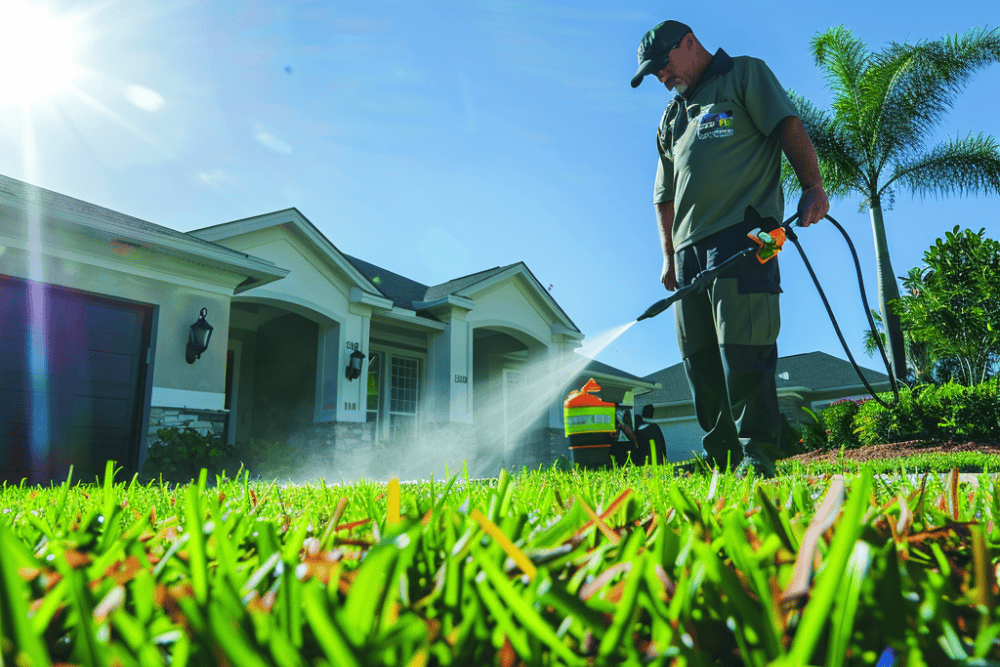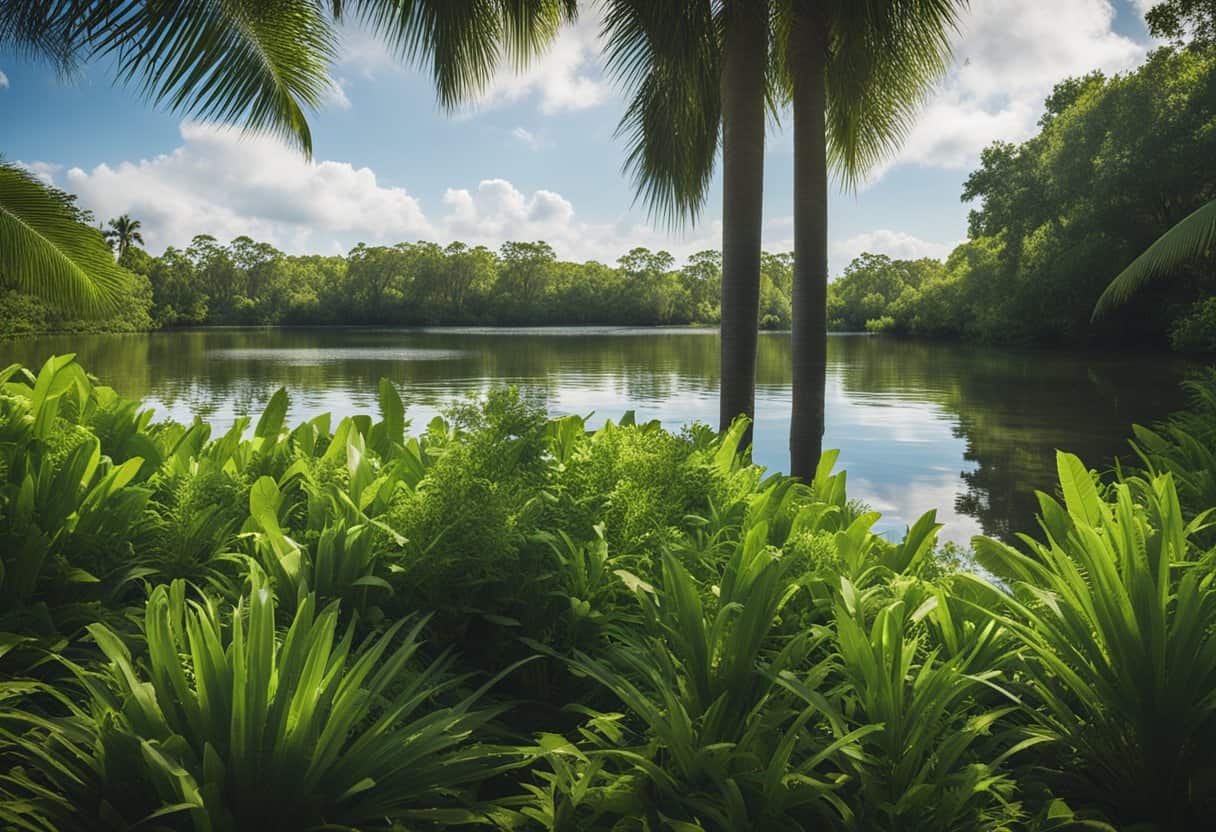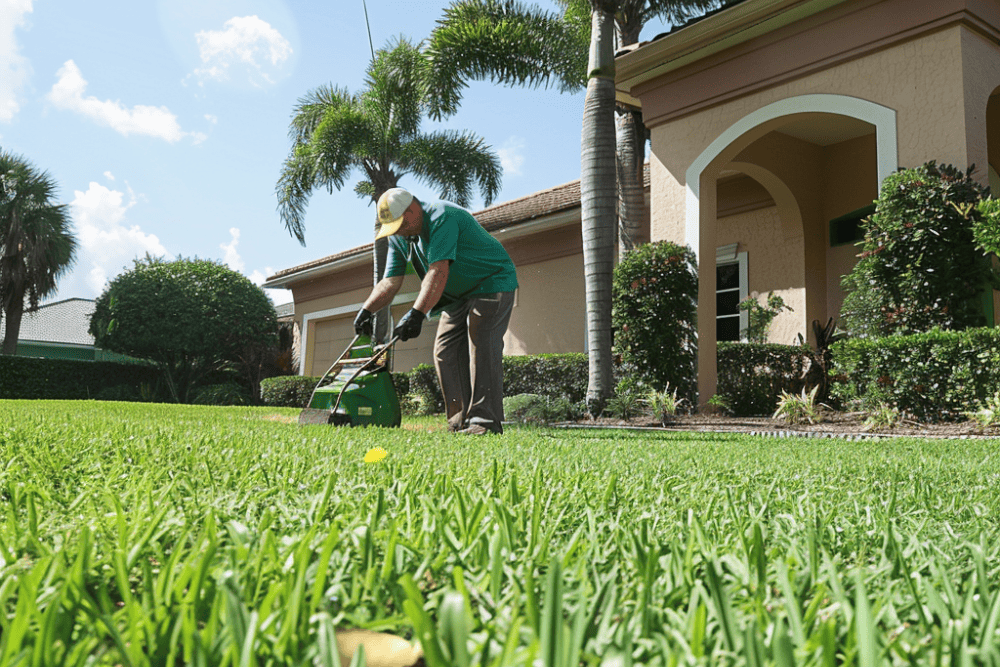Understanding Florida’s Fertilizer Restrictions
Florida takes steps each year to protect its unique environment. You’ll find that these measures focus on the health of local waterways during the wettest months.

A Contractor Applying Liquid Fertilizer to a Residential Yard
Importance of Fertilizer Ordinances
Florida’s laws on fertilizer play a big role in keeping the water clean. During the rainy season, heavy rains can wash fertilizer into rivers, lakes, and beaches. This leads to algae growth that harms fish and plant life. If you’re a Florida resident, it is more likely than not that your county or city has rules that ban or restrict using certain types of fertilizer from June 1 through September 30. This helps to stop too much nitrogen and phosphorus from getting into the water.
The Rainy Season
Florida’s rainy season hits hard. From June to September, you can expect lots of rain almost daily. Because of this, fertilizers that aren’t taken up by plants can easily end up in the water without even being absorbed by your targeted flora. This is why Florida places a ban on certain fertilizers during these wet months.
Impact on Water Bodies and Ecosystem

Runoff containing excess fertilizer can harm waterways
Florida’s warm climate often leads to high levels of nutrient pollution in natural water bodies, which can cause significant harm to ecosystems, especially during the hotter months.
Protection of Lakes and Springs
You play a role in maintaining water quality by following fertilizer restrictions. These rules help protect your favorite lakes and springs from nutrient overflow, which can otherwise lead to unwanted plant growth and harm fish habitats.
Challenges with Algae Blooms
Nutrient-rich runoff is a main cause of algae blooms in bay waters and lakes. These blooms consume oxygen and block sunlight, threatening fish and plant life. By adhering to fertilizer bans, you help prevent toxic blue-green algae that can cause fish kills and affect human health. Your actions keep these natural areas safe and vibrant for local wildlife and your community.
Best Practices for Lawn and Garden Care
Proper care for your lawn and garden starts with understanding your soil and choosing the right plants. By managing nutrients and embracing eco-friendly methods, you can maintain a healthy landscape.
Soil Testing and Nutrient Management
Before you add any fertilizer, test your soil to see what it needs. A soil test reveals levels of nitrogen, phosphorus, and other key nutrients. If the test shows high phosphorus, you should avoid adding more. It is important to follow Best Management Practices for nutrient use to reduce runoff and pollution.
- Nitrogen: Use fertilizers with slow-release nitrogen to feed your lawn over time.
- Phosphorus: Apply only if your soil test shows a need for it.
- Compost: Enhance soil and reduce the need for chemical fertilizers.
Don’t guess what your soil needs. Test it and follow guidelines.

Testing your soil can prevent the application of unnecessary fertilizer
Eco-Friendly Landscaping Tips
Select plants that grow well in Florida’s weather to reduce the need for watering and fertilizing. Native plants often need less care (and fertilizer) and help local wildlife thrive.
- Mow your grass to the right height to promote strong roots.
- Opt for ground covers in hard-to-mow areas.
Local Government and Legislative Actions
In Florida, you see a mix of local and state-level actions surrounding fertilizer use, each shaping how to care for the environment.
County and Municipal Fertilizer Bans
Local governments across Florida have set rules to control how you use fertilizer. Counties and municipalities aim to protect water quality, especially during the rainy season from June to September. For example, Lee County, Charlotte County and Collier County have specific restrictions on the use of certain fertilizers during these wet months. These local rules help reduce the runoff that can harm streams, rivers, and even the ocean.
Lee County Fertilizer Restrictions
Charlotte County Fertilizer Ordinance
Collier County Fertilizer Ordinance
State-Level Environmental Policies
At the state level, Florida Department of Environmental Protection oversees wider environmental policies. Yet, recent activities in the legislature show a push to prevent local cities and counties from making their own rules on fertilizer use.
Statewide Map of Florida Fertilizer Restrictions by Location
Community Engagement and Compliance
Frequently Asked Questions
Navigating Florida’s fertilizer laws during the summer can be tricky. Here’s what you need to know to keep your lawn healthy and stay within the rules.
What are the summer regulations for applying fertilizer in Florida?
From June to September, Florida places strict rules on lawn care. In many locations, you cannot use fertilizers with nitrogen or phosphorus during this time to protect waterways from runoff. Be sure to check out the requirements in your county and/or city for more details.
Can I purchase any type of fertilizer during the blackout period in Florida?
Yes, you can buy them, yet you’re not allowed to apply fertilizers containing nitrogen or phosphorus. Instead, consider products like compost or micronutrient fertilizers as they are acceptable.
How often should I be fertilizing my lawn throughout the year in the Florida climate?
Typically, fertilizing is done from October to May, avoiding the summer months. Aim for every two to three months, but always test your soil first to see if it’s needed. Overfertilization can be detrimental to both your lawn and waterways.
What alternative lawn care practices can I use when fertilizer restrictions are in place?
Focus on mowing correctly, watering efficiently, and using organic compost to feed your lawn. These practices help your lawn stay resilient even without traditional fertilizers.
Which fertilizers are recommended for Florida lawns outside of the restriction period?
Look for fertilizers with at least 50% slow-release nitrogen and be cautious with phosphorus. Your lawn may already have enough, so check your local extension service for advice.
What are the consequences of not adhering to Florida’s fertilizer application ban in the summer?
Ignoring the ban can lead to fines and harm local ecosystems. It’s important that you follow the rules to avoid these problems and contribute to keeping Florida’s waterways clean.